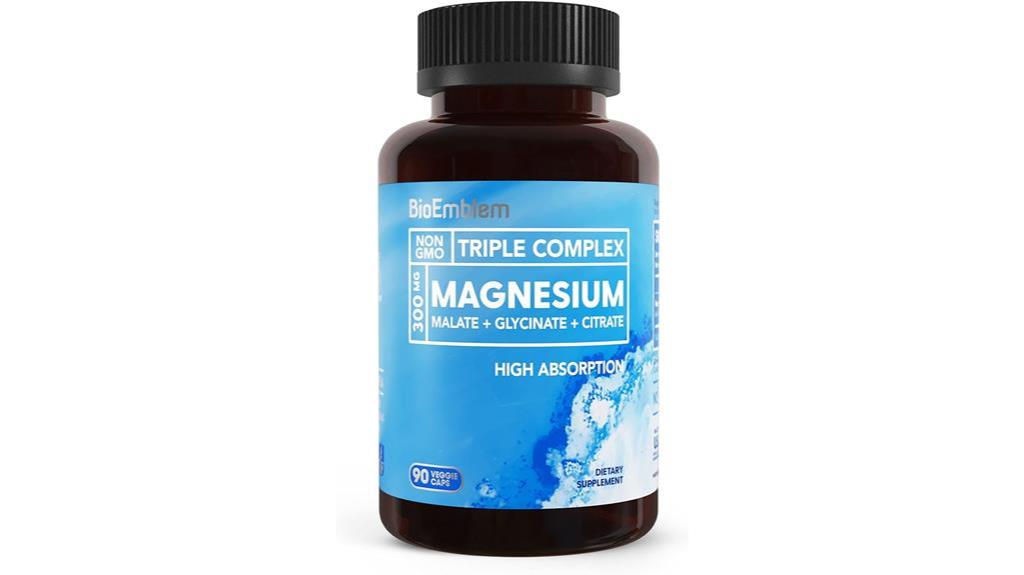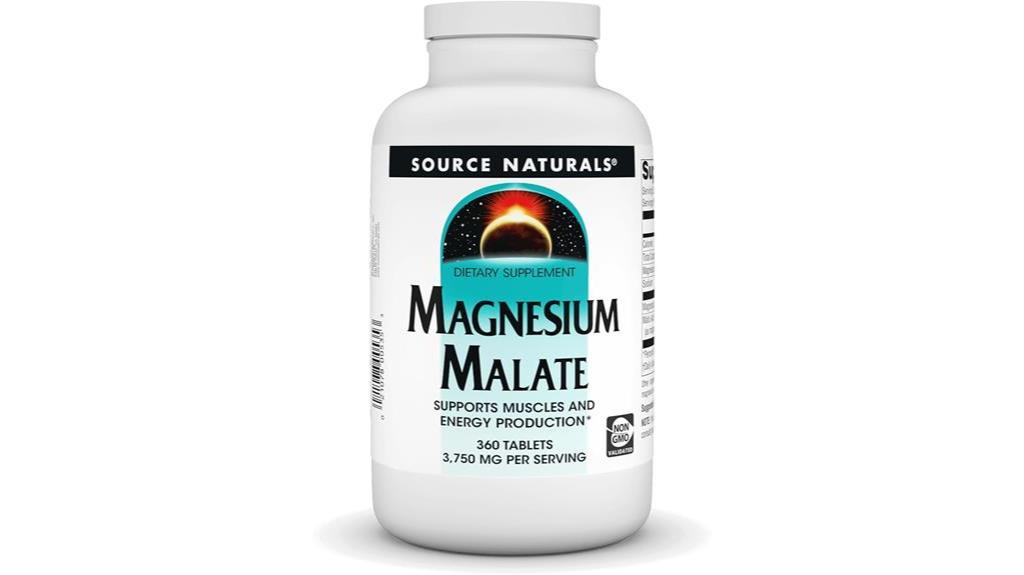When it comes to boosting energy production, health experts recommend three top magnesium supplements. First, Bluebonnet Nutrition Magnesium Citrate offers 400mg of highly absorbable magnesium, perfect for energy enhancement. Next, we have BioEmblem Triple Magnesium Complex, combining three forms for better absorption and muscle relaxation. Finally, Source Naturals Magnesium Malate provides a robust 3750mg, ideal for those dealing with fatigue. Each of these supplements supports over 300 biochemical reactions critical for energy levels. Curious about how to choose the right one for you? Let's explore some additional insights that can guide our selection.
Key Takeaways
- Bluebonnet Nutrition Magnesium Citrate: Offers 400mg of highly absorbable magnesium, supporting over 300 biochemical reactions related to energy production.
- BioEmblem Triple Magnesium Complex: Contains 300mg of three absorbable forms, promoting muscle relaxation and improved sleep essential for energy levels.
- Source Naturals Magnesium Malate: Provides 3750mg of magnesium chelated with malic acid, beneficial for energy metabolism and conditions like fibromyalgia.
- Absorption Efficiency: Magnesium citrate and glycinate are superior for bioavailability, enhancing energy production when taken with food.
- Synergistic Combinations: Pairing magnesium with Vitamin D3 and B vitamins optimizes energy metabolism and supports overall health.
Bluebonnet Nutrition Magnesium Citrate 400mg Caplets

If you're looking for a high-quality magnesium supplement that maximizes absorption and supports energy production, Bluebonnet Nutrition Magnesium Citrate 400mg Caplets are an excellent choice. Each caplet delivers 400mg of magnesium in a chelated form, enhancing absorption over standard magnesium sources. This non-GMO, vegan supplement is free from common allergens, making it suitable for various dietary needs. With over 300 biochemical reactions relying on magnesium, you'll appreciate its role in energy production, immune health, and stress reduction. Users often notice improved relaxation and sleep quality. While the caplets may seem large, many find them easy to swallow. For best results, consider splitting doses throughout the day and pairing them with other supplements like Vitamin D3.
Best For: Those seeking a high-quality, easily absorbed magnesium supplement to support stress relief, energy production, and overall health.
Pros:
- High absorption due to chelated magnesium citrate formulation.
- Free from allergens, making it suitable for various dietary restrictions.
- Positive user feedback on relaxation and sleep improvement.
Cons:
- Caplets may be large, which could be challenging for some users to swallow.
- Slightly expensive compared to other magnesium supplements on the market.
- Occasional delivery issues reported by users regarding incorrect product orders.
BioEmblem Triple Magnesium Complex (90 Capsules)

BioEmblem Triple Magnesium Complex is an excellent choice for active individuals seeking to enhance their energy levels and overall well-being. With 300mg of three highly absorbable forms of magnesium—Glycinate, Malate, and Citrate—this supplement guarantees maximum bioavailability. It's vegan, non-GMO, gluten-free, and free from unnecessary fillers and artificial ingredients, making it a clean option for your health regimen.
Many users report improved muscle relaxation, better sleep quality, and reduced inflammation after incorporating this supplement into their daily routine. While some may experience mild side effects, adjusting your intake and taking it with food can help. Overall, BioEmblem Triple Magnesium Complex is a reliable choice to support muscle function, sleep, and energy production, especially for those with active lifestyles.
Best For: Active individuals seeking to enhance muscle function, sleep quality, and overall well-being.
Pros:
- Highly absorbable forms of magnesium (Glycinate, Malate, Citrate) for maximum bioavailability.
- Vegan, non-GMO, gluten-free, and free from fillers and artificial ingredients.
- Positive user experiences include improved muscle relaxation, better sleep, and reduced inflammation.
Cons:
- Some users may experience mild side effects like nausea and diarrhea.
- Individual responses may vary, requiring adjustments in intake.
- Taking the supplement with food is necessary to avoid discomfort for some users.
Source Naturals Magnesium Malate 3750 mg (360 Tablets)

Source Naturals Magnesium Malate 3750 mg is an excellent choice for those seeking a natural boost in energy production and overall well-being. Each serving delivers 3750 mg of magnesium, chelated with malic acid for enhanced absorption. It's suitable for vegetarians and free from common allergens, making it a safe option for many. The recommended dosage ranges from 1 to 3 tablets daily, and starting with one tablet can help you gauge your tolerance. Users have reported benefits like improved muscle relaxation, reduced symptoms of fibromyalgia, and better sleep quality. However, be mindful of potential gastrointestinal issues at higher doses. Pairing this supplement with a balanced diet and hydration can maximize its effectiveness for your health journey.
Best For: Individuals seeking a natural supplement to support energy production, muscle relaxation, and overall well-being.
Pros:
- Suitable for vegetarians and free from common allergens like gluten and dairy.
- Enhanced bioavailability due to chelation with malic acid, improving absorption.
- Positive user experiences report benefits for conditions like fibromyalgia and chronic pain.
Cons:
- Some users may experience gastrointestinal issues, such as diarrhea or cramps, especially at higher doses.
- Gradual introduction is necessary for those sensitive to magnesium to avoid adverse reactions.
- Potential mild overdose symptoms include nausea and dizziness if not properly monitored.
Factors to Consider When Choosing Magnesium for Energy Production

When selecting a magnesium supplement for energy production, we need to take into account several important factors. The form of magnesium, proper dosage, and how well our bodies absorb it play vital roles in its effectiveness. Let's explore these aspects to guarantee we make the best choice for our energy needs.
Types of Magnesium Forms
Choosing the right magnesium supplement can make a significant difference in energy production and overall well-being. We have a variety of magnesium forms to evaluate, each with unique properties that can enhance our energy levels. For example, magnesium citrate and glycinate are chelated forms that offer superior bioavailability compared to non-chelated options like magnesium oxide. This means they're more effective in boosting our energy production.
Magnesium malate is particularly significant as it plays an essential role in the Krebs cycle, which is critical for ATP production—the energy currency of our cells. If we're looking to enhance our energy metabolism, malate could be the way to go.
Also, magnesium citrate isn't just good for energy; it supports digestive health and regularity, ensuring that we're absorbing nutrients efficiently. This indirect support can be beneficial for maintaining sustained energy levels.
Dosage Recommendations
Determining the right dosage of magnesium is essential for maximizing its benefits in energy production. We recommend aiming for at least 400 mg daily, as this amount plays a significant role in supporting our energy levels and enzyme function. However, individual tolerance can vary. Many of us might want to start with lower doses, like one tablet, and gradually increase as needed to avoid any gastrointestinal discomfort.
Spacing out doses throughout the day can also help improve absorption and minimize side effects, especially for those of us who are sensitive to magnesium. If we're using magnesium specifically to boost energy, we should consider forms like citrate or malate, which often offer better bioavailability.
Taking magnesium supplements with food is another important factor. This practice not only enhances absorption but also helps reduce potential gastrointestinal issues that can arise from taking magnesium on an empty stomach. By being mindful of these dosage recommendations, we can optimize our magnesium intake and effectively support our energy production needs. Let's make informed choices to harness the full benefits of magnesium for our well-being!
Absorption Efficiency
Understanding absorption efficiency is vital for us as we select the right magnesium supplements to boost our energy production. Not all magnesium forms are created equal; for instance, magnesium citrate is known for its superior absorption compared to magnesium oxide. This makes it a preferred choice for maximizing our energy levels.
Additionally, we should consider chelated magnesium forms like glycinate and malate, which enhance bioavailability and allow for more efficient utilization in our body's biochemical processes. Magnesium malate, in particular, contains malic acid, which further improves absorption and is particularly beneficial for energy metabolism in our muscle cells.
It's also important to remember that taking magnesium with food can enhance its absorption and reduce gastrointestinal discomfort, leading to better overall effectiveness. Since individual responses to magnesium can vary, we may need to adjust the type and dosage to optimize our absorption and benefits. By being mindful of these factors, we can guarantee that the magnesium supplements we choose will effectively support our energy production needs.
Bioavailability Importance
When it comes to maximizing the benefits of magnesium for energy production, bioavailability plays a critical role in our selection process. Bioavailability refers to the proportion of magnesium that our bodies actually absorb and use. To guarantee we're getting the most out of our supplements, we need to take into account the different forms available. For instance, magnesium citrate is known for its high bioavailability, making it an excellent choice for enhancing energy production.
We should also be aware that chelated forms of magnesium typically offer superior absorption compared to non-chelated options. Additionally, factors such as the presence of other nutrients, the method of formulation, and our individual digestive health greatly impact how well magnesium is absorbed.
It's essential for us to choose supplements that are free from fillers and artificial ingredients, as this can further improve absorption rates. By focusing on bioavailability, we can make informed decisions that lead to more effective magnesium supplementation, ultimately supporting our energy levels and overall well-being. Remember, the right choice can make all the difference in how we feel and perform daily.
Health Benefits Overview
Many of us may not realize just how essential magnesium is for our overall health and energy production. This important mineral is involved in over 300 biochemical reactions in our bodies, greatly impacting our energy levels and enzyme function. By regulating calcium and zinc levels, magnesium helps maintain bone density and supports muscle recovery after exercise, enabling us to bounce back faster.
Additionally, adequate magnesium intake can enhance our sleep quality and reduce stress, both critical for sustaining our energy throughout the day. It also supports cardiovascular health by ensuring proper muscle function, including that of the heart, which contributes to efficient blood circulation and oxygen delivery.
When we're low on magnesium, we may experience fatigue, muscle cramps, and decreased exercise performance. This highlights the importance of magnesium, especially for those of us looking to optimize our energy levels.
Side Effects Consideration
While magnesium offers numerous health benefits, it's important to be aware of potential side effects when considering supplements for energy production. Many of us may experience gastrointestinal issues like diarrhea and cramps, especially when taking magnesium in higher doses or on an empty stomach. If we're increasing our magnesium intake, we might also feel nausea, particularly if we're sensitive to the mineral or the specific formulation we choose.
To minimize these adverse reactions, we recommend gradually introducing magnesium into our routine. This approach allows our bodies to adjust more comfortably. It's also essential to adhere to the recommended dosages, as symptoms of mild overdose—such as nausea, dizziness, and severe abdominal cramps—can occur if we're not careful.
Moreover, let's be cautious about combining magnesium with other supplements. Interactions can exacerbate side effects or affect how well our body absorbs the magnesium. By staying informed and listening to our bodies, we can enjoy the benefits of magnesium for energy production while minimizing unpleasant side effects.
Combining With Other Supplements
Exploring the right combinations of supplements can greatly enhance the benefits of magnesium for energy production. When we pair magnesium with Vitamin D3, we not only boost calcium absorption but also support our bone health, both essential for overall vitality. Magnesium acts as a cofactor in numerous enzymatic reactions, which means it works synergistically with other nutrients. For instance, combining it with B vitamins can optimize our energy metabolism and help reduce fatigue.
Including calcium with our magnesium supplementation can maintain balanced muscle function, preventing cramping during physical activities and ultimately supporting our energy levels. Additionally, the combination of magnesium and omega-3 fatty acids can improve cardiovascular health, enhancing oxygen delivery throughout the body, which is critical for energy production.
We shouldn't overlook antioxidants, either. Pairing magnesium with Vitamin C can help mitigate oxidative stress, potentially improving our energy levels and aiding recovery after exercise. By thoughtfully combining magnesium with these other supplements, we can maximize its benefits, ensuring we feel our best and stay energized throughout our day.
Dietary Factors Impact
When choosing magnesium for energy production, we must consider several dietary factors that can greatly impact its effectiveness. Magnesium is essential for over 300 enzymatic reactions, including ATP synthesis, which is fundamental for energy. A diet low in magnesium can lead to fatigue and impaired muscle function, making it important to guarantee adequate intake.
Incorporating magnesium-rich foods like leafy greens, nuts, seeds, and whole grains can enhance our overall magnesium levels, supporting better energy production. These foods not only supply magnesium but also provide other nutrients that contribute to metabolic processes.
We should also pay attention to the bioavailability of magnesium from different dietary sources. Magnesium citrate and glycinate are more easily absorbed compared to other forms, making sure we maximize energy levels. Additionally, magnesium plays a role in regulating calcium and potassium levels, essential for muscle contractions and nerve functions.
Frequently Asked Questions
Can Magnesium Supplements Interact With Other Medications?
We've often wondered if magnesium supplements might interact with other medications. The truth is, they can! Magnesium may affect the absorption of certain drugs, like antibiotics or blood pressure medications. It's vital to consult with a healthcare professional before starting any supplement, especially if we're taking prescription meds. By doing so, we can guarantee our health and avoid any potential complications while reaping the benefits of magnesium supplementation.
What Are the Signs of Magnesium Deficiency?
When we think about magnesium deficiency, we might notice signs like fatigue, muscle cramps, and irritability. Other symptoms can include irregular heartbeat, numbness, and weakness. If we've experienced any of these, it's important to pay attention. We often overlook how vital magnesium is for our overall health. If we suspect a deficiency, consulting a healthcare professional can help us understand our symptoms better and determine the best way to address them.
How Long Does It Take to Feel Magnesium's Effects?
Did you know that nearly 50% of Americans don't get enough magnesium? When we start taking magnesium, many of us might notice effects within a week, while others may take up to a month to feel significant changes. It often depends on factors like our individual health and lifestyle. So, if we're considering magnesium supplementation, we should be patient and give our bodies time to adjust and reap the benefits.
Is It Safe to Take Magnesium Daily?
We often wonder if taking magnesium daily is safe. Generally, it's considered safe for most people when taken in recommended doses. However, we should always listen to our bodies and consult with a healthcare professional if we have any concerns. Excessive magnesium can lead to side effects, so it's essential to find a balance. By doing our research and consulting experts, we can guarantee we're making the best choices for our health.
Can I Get Enough Magnesium From Diet Alone?
Did you know that nearly half of us don't get enough magnesium from our diets? While it's possible to meet our magnesium needs through food, it can be challenging. Foods like nuts, seeds, whole grains, and leafy greens are great sources, but many of us don't consume them regularly. So, we should be mindful of our intake and consider tracking our diet to guarantee we're getting enough magnesium to support our overall health.
